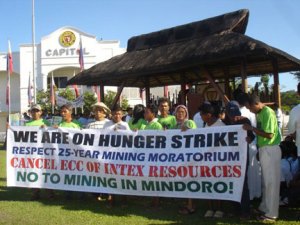
Members of the indigenous Mangyan community hold a streamer on the ground of the provincial capitol of Oriental Mindoro in Calapan City on November 16 protesting the Mindoro Nickel Project of the Norway-based Intex Resources. They are set to start a hunger strike in front of the DENR head office in Quezon City to call for the immediate revocation of the mining clearance. FR. EDWIN GARIGUEZ/ALAMIN
PRESS RELEASE
Hunger strikers from the Alyansa Laban sa Mina (ALAMIN) have agreed to sit down for a dialogue with Environment Secretary Lito Atienza but only to press its non-negotiable demand to revoke the mining clearance of Norway-based Intex Resources.
“We will dialogue only to make our non-negotiable demand that Atienza revoke the environmental compliance certificate illegally issued to Intex Resources,” said ALAMIN spokesman Fr. Edwin Gariguez.
Sixteen Mangyans, together with Gariguez and eight others, will begin their hunger strike in front of the main office of the Department of Environment and Natural Resources in Quezon City on November 17 to protest the mining project.
Atienza said over the weekend he would like to know the objections of the Mindorenos and their advocates to the mining project, adding he was willing to reconsider the ECC if found defective.
But Gariguez said the former Manila mayor should have called for a dialogue even before he gave Intex the go-ahead signal to mine 11,216.6 hectares of land on Mindoro island.
“Now Atienza wants to dialogue? He should have done that before approving the ECC of Intex,” Gariguez.
He said the environment chief violated mining and local government laws with the ECC issuance.
“The violation or defects in the ECC process are very clear,” Gariguez said.
“It is required by the law that the decision and positions of the local government units (LGUs) and stakeholder communities be respected as provided in Section 70 of the Mining Act of 1995 and pursuant to Section 26 and 27 of the Local Government Code of 1991,” he said.
“Consultation with and consent of LGUs are prerequisite before issuing the ECC to any environmentally-critical projects, like mining. But Atienza trivialized and made a mockery of this legal requirement,” Gariguez said.
Oriental Mindoro has ordered a 25-year ban on large-scale mining in the province while the municipal government of Sablayan issued an ordinance opposing the mining project.
“Atienza, by issuing the ECC unilaterally, without the consent of the LGUs, insulted the people of Mindoro by maliciously promoting the interest of the Norwegian company, Intex Resources, and totally disregarding the objection of the stakeholder LGUs,” Gariguez said.
The 25 hunger strikers represent the 25-year moratorium on large-scale mining imposed by the local governments of Mindoro, organizers said.
Early this month, the island’s two governors, Arnan Panaligan of Oriental Mindoro and Josephine Ramirez-Sato of Occidental Mindoro, threatened to sue Atienza over the “patently illegal” issuance of the mining clearance.
For more information:
Fr. Edwin A. Gariguez
Mobile number: (0919) 8005595
Email: edugariguez@gmail.com
Filed under: 1 | Tagged: Alamin, Alyansa Laban sa Mina, Arnan Panaligan, Climate change, DENR, Department of Environment and Natural Resources, Edwin Gariguez, Global warming, Hunger strike, Indigenous people, Intex, Intex Resources, Josephine Ramirez-Sato, LGU, Lito Atienza, Local Government Code, Mangyan, mining ban, Mining moratorium, Press Release | 1 Comment »










